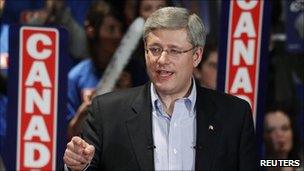Canadian political leaders clash in televised debate
- Published

Prime Minister Stephen Harper needs to elect only 12 more MPs to form a majority government
Canada's embattled prime minister has clashed with three opposition leaders in the first of two televised debates, ahead of the 2 May election.
Liberal Party leader Michael Ignatieff accused Mr Harper of deceit, saying Canadians "don't have confidence in your management of the economy".
Mr Harper said the opposition had provoked an unnecessary election at a key time for the economy.
Polls suggest the Conservatives will likely win re-election.
The election was prompted by a non-confidence vote in Canada's parliament after Mr Harper's government was found to be in contempt of parliament because of its failure to disclose the full costs of anti-crime programmes, corporate tax cuts and plans to purchase stealth fighter jets from the US.
The Conservatives have about 40% support, according to recent poll, with the main opposition Liberal Party on about 30%.
But with nearly 25% of voters said to be still undecided, correspondents say the televised debates could have an impact on the election.
Questions over spending
Mr Harper was immediately put on the defensive by Bloc Quebecois Leader Gilles Duceppe over controversies surrounding G8/G20 summit spending and corporate tax cuts.
A leaked draft report on last summer's G8/G20 summit in Canada alleged the government spent millions of dollars on dubious projects and that parliament was "misled" about the spending.
Mr Duceppe called on Mr Harper to release the auditor general's report that alleged the Canadian government misinformed parliament to win approval for a $50m (£32) G8 fund that put money toward questionable projects.
The report, which Auditor General Sheila Fraser has said she will not release until after the new parliament is seated, suggests the process by which the funding was approved may have been illegal.
Mr Ignatieff and New Democratic Party (NDP) leader Jack Layton soon jumped into the conversation, demanding answers on spending practices.
"The Conservative Party is the problem here when it comes to the economy," Mr Layton said.
Mr Layton added that Conservative corporate tax cuts contributed to "why people can't make ends meet, why so many people are still out of work".
"Your policies don't address them," he said.
Mr Ignatieff also accused Mr Harper of pushing corporate tax cuts, which he said the Liberal Party would end in order to pay for a student grants programme.
"We can invest in Canadian learning," Mr Ignatieff said.
"That's a billion-dollar investment ... you spent that in 72 hours on the G8/G20 photo-op."
The debate was seen as a good chance for Mr Ignatieff, who has been portrayed as an elitist in political attack ads, to improve his image.
But despite an energetic campaign, Mr Ignatieff has made little headway in opinion polls, with his party trailing the Conservatives by 8.5 points in a Nanos Research poll, external released on Tuesday.
'Unnecessary election'
During the English-language debate on Tuesday evening, Mr Harper said opposition parties had provoked what he believed was an unnecessary election at a time when Canadians should be focusing on the economy.
But Mr Ignatieff struck back at Mr Harper, saying Canada was "having an election because you didn't tell parliament the truth".
Mr Ignatieff's Liberal Party, which has governed Canada for longer than any other group, is struggling partly because they are now competing with the New Democrats for the same portion of the electorate.
The debate was broken down into six portions, which saw two of the four leaders debating in six-minute showdowns.
Each segment began with a question from a Canadian voter, and ended with a brief free-for-all debate involving all four leaders.
A debate in French, which is the other official language of Canada, will take place on Wednesday evening.
- Published12 April 2011
- Published5 April 2011
- Published8 April 2011
- Published1 April 2011
- Published27 March 2011